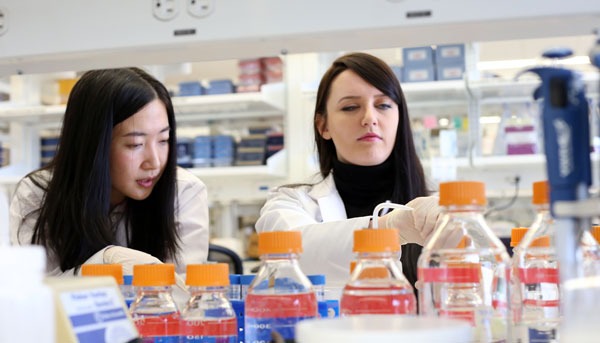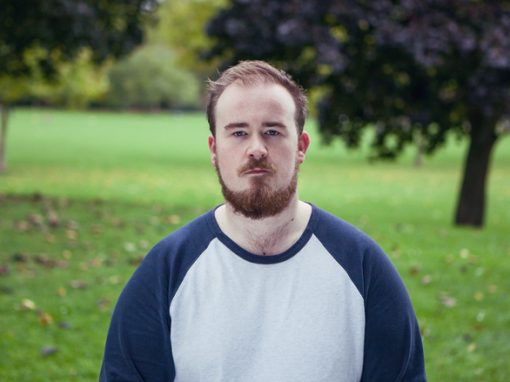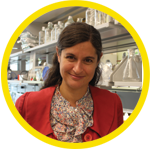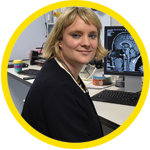
Fellows Award
The Fellows Award supports the best and brightest early career scientists from across the globe, who are asking challenging questions that will contribute to transformative advances in mental health research.
By supporting a diverse portfolio of early career scientists MQ is working to retain talent in the field, and increase the diversity, of the professionals researching mental health conditions such as depression, Borderline Personality Disorder and anxiety.

Apply for our US Fellows Award 2024
Who can apply: Early-career researchers based in the USA.
Funding period: 3 years
Funding amount: up to £225,000* ($285,000 is an estimated equivalent based on current exchange rates which can vary.)
MQ seeks to fund a diverse research portfolio that reflects a bio-psycho-social approach to mental health. The 2024 MQ Fellows Awards are open to researchers anywhere in the USA and from all disciplines related to mental health research. Research can be based in the laboratory, clinic or field and may involve theoretical, experimental, social science or medical humanities approaches.
MQ is particularly interested in the following highlight areas:
- Children and young people: research that explores adolescent mental health treatment and prevention including but not limited to, anxiety, depression, and ADHD.
- Public mental health: research that is focused on topics such as under-represented populations, the determinants of mental health, the distribution of mental illnesses across populations, community mental health, mental health within schools as well as on policy and equity issues.
- Prevention and treatment: research that detects targets for intervention, tests the effectiveness of interventions, culturally validates interventions, and develops new interventions or tailors existing interventions to improve effectiveness and reach to underserved populations.
- Suicide Treatment & Prevention: Research that considers novel interventions to reduce early mortality in those in mental distress. (See O’Connor et al. 2023)
- Psychosis: Research looking at mechanisms and treatments of early psychosis.
- Bipolar Disorder: Research looking at the mechanisms and improved treatments of bipolar disorder
Watch the webinar
In this webinar MQ's Director of Research partnerships and Development Emily Wheeler and MQ Ambassador Kendelle Tekstar shared more information about the Fellowships, the eligibility criteria, application timeline and answered questions.
You can also watch this webinar on MQ's YouTube channel.
If you have questions about the 2024 US MQ Fellowships please contact [email protected]
Who are the MQ Fellows?
MQ has awarded 30 Fellowships in the 10 years since we were founded, investing over £5,1 million in ground-breaking research projects, addressing some of the biggest mental health challenges.
Dr Susanne Ahmari (USA) - identified brain activity related to Obsessive behaviours, the first step towards developing new treatments for OCD.
Professor Bronwyn Graham (Australia) - found that women with anxiety, who had low levels of the hormone oestrogen, were less likely to get better, and stay better, following psychological treatment. This means that if we can schedule treatment when oestrogen is highest it could end up being more effective.
Dr Joshua Roffman (USA) - found that by increasing the consumption of folic acid during pregnancy, changes occur in children’s brain development, thus reducing the incidence of psychotic symptoms in later life.
Dr Jeremiah Cohen (USA) - used innovative techniques to explore the role that brain chemical serotonin plays in affecting mood which will lead to better drugs to treat mood disorders in the future.
Professor Helen Fisher (UK) - uncovered the key factors that lead to the development of psychotic symptoms in children, which led to improvements in clinical interventions for vulnerable young people.
Professor Sergiu Pasca (USA) - developed a method to create 3D brain circuits ‘in a dish’, providing a pioneering new way to understand how different parts of the brain develop.
Dr Andrea Reinecke (UK) - developed a life changing intervention for panic disorder that combined CBT and a blood pressure drug into a treatment that only needed to be delivered once.
Dr Johannes Graff (Switzerland) - identified the brain cells which store and reduce traumatic memories, offering hope for testing new interventions.
Dr Ian Maze (USA) - took a novel, multi-disciplinary approach to understanding how serotonin impacts major depressive disorder which could lead to improved pharmacological treatments for depression.
Dr Martijn Van Den Heuvel (Netherlands) - mapped the activity between different areas of the brain in various mental health conditions.
Dr Ethel Nakimuli-Mpungu (Uganda) - developed a highly successful intervention for remote communities living with HIV and depression.
Dr Claire Gillan (Ireland) - created an internet-based tool which uses AI to predict how effective antidepressants will be for different individuals.
Professor Jean-Baptiste Pingault (USA) - found strong evidence around the direct impact of bullying on the development of mental health problems in young people.
Dr Patrick Rothwell (USA) - identified the brain cells related to impulse control which could lead to the development of treatments to curb negative behaviours.
Dr Sam Norton (UK) - developed a new app that can be used by healthcare professionals to track physical and mental health symptoms in people with arthritis, so that they can identify who is at risk of ongoing problems.
Dr Claire Llewellyn (UK) - identified some childhood eating behaviours as potentially predisposing risk factors to future onset of eating disorders.
Dr Petra Vértes (UK) - used genetics to improve understanding of the biological underpinnings of Schizophrenia.
Dr Jessica Eccles (UK) - found that a novel treatment was effective in reducing anxiety in people who have hypermobility.
Dr Simon Kariuki (Kenya) - examined genetic samples from African populations to identify a shared genetic risk between epilepsy and mental health disorders.
Dr Teresa Tavassoli (UK) - shed light on the relationship between sensory differences and mental health symptoms in autistic children.
Dr Mark Taylor (Sweden) - found that autistic people are at high risk for mental health problems when they are a young adult and is now investigating the specific reasons why.
Dr Ruchika Gajwani (UK) - is working on improving the detection and diagnosis of young people with borderline personality disorder (BPD).
Dr Katherine Young (UK) - who later handed the project over to Dr Colette Hirsh, investigated the impact of the pandemic on young people’s mental health.
Dr Amy Ronaldson (UK) - is researching why people with severe mental illnesses are more likely to die from infectious disease than people without them.
Professor Gareth Griffith (UK) - is working to improve the detection of selection bias in order to improve representativeness in mental health research.
Dr Marisa Marracini (USA) - is co-designing a virtual reality tool to help adolescents who have been hospitalised for suicide-related crisis.
Dr Massimiliano Ori (Canada) - is working to understanding how youth comorbid mental and physical disorders may affect risks of suicide.
Dr Moritz Herle (UK) - is using data science and insights from people with lived experience to understand why people with eating disorders are at increased risk of suicide.
Dr Leslie Johnson (USA) - is adapting and testing an existing treatment for people with type 2 diabetes in order to treat patients with type 1 diabetes.
Dr Suhas Ganesh (India) - is working to better understand how an individual’s environment, and their genetic make-up, affects treatments for schizophrenia.
Dr Alexandre Lussier (USA/Canada) - is running a longitudinal study of gene- environment interactions and epigenetic mechanisms to understand how depressive disorders influence suicide risk.
Dr Alexandra Buton (UK) - is exploring is social prescribing can prevent people with serious mental illnesses from developing cardiovascular diseases.

How are Fellows chosen?
Prestigious MQ Fellows Awards are allocated by a committee of interdisciplinary scientists who are global leaders in their fields.
They award funding after a rigorous application process, during which the methodology, inter-disciplinary approach, eligibility, research environment, and impact are all closely assessed
The Fellows Panel
The Fellows panel, chaired by Marcus Munafo and coordinated by deputy chair Thalia Eley, is made up of an expert team of interdisciplinary scientists. They will review each application and assess their suitability for funding.

Eligibility
MQ Fellows go through a rigorous application process to receive funding of up to £225,000 (GBP) for up to three years. Awards support early career researchers who wish to establish their independence The onus is on applicants to demonstrate that they are at the appropriate career stage. They must:
- have a PhD, DPhil, DClinPsy, MBBS, MD or equivalent
- have accumulated 3-7 years whole-time-equivalent research experience, equivalent in nature to postdoctoral research
- be able to show that this award will help to establish independence relative to current position
Use of funds is flexible, and could include :
- Start-up funding for a specific project or transition funding for a current project
- Salary support (for the applicant or any research support staff e.g. research assistant)
- Direct research costs (e.g. research consumables, specialist equipment*)
- Travel costs (e.g. visit to collaborators, project mentors and attending conferences)
- Patient and public involvement costs
- Other costs (e.g. high cost items or experiments e.g. gene expression, fees for external or internal services, publication costs)
Indirect costs should be covered by the host institution.

Fellows Award policies
The funded Institution must ensure that the Award-holder and others supported by the MQ Award are made aware of, and comply with MQ's funding policies.
MQ Privacy Policy for research funding
Application guidance for US Fellowships 2024
Our Co-funded Fellows
We’re committed to partnering with other research organisations, charities and scientific bodies so we can share ideas, maximise resources, and carry out transformative projects, including our joint Fellows Awards with JDRF, AFSP, Arthritis Research UK, Autistica, and the Broad Institute.
Stay up-to-date
Sign up below to hear more about this programme, the latest funding opportunities, and more ways to get involved in our work.
Our projects

Sensitive periods for the effects of depression on suicide risk: a longitudinal study of gene-environment interactions and epigenetic mechanisms
Principal investigator:Dr Alexandre Lussier
Dr Lussier aims to determine the extent to which child and adolescent depression interacts with genetic susceptibility to influence suicide risk in early adulthood.

Increasing access to social prescribing for people living with severe mental illnesses at risk of cardiovascular disease
Principal investigator:Dr Alexandra Burton
People with severe mental illnesses are at high risk of heart disease due to lack of physical activity and social isolation. Social prescribing can help, but is it accessible?

Why are people with eating disorders at higher risk of suicide?
Principal investigator:Dr Moritz Herle
There is currently no explanation why people with eating disorders are at a higher risk of suicide. This project aims to build and test a theoretical model.
Our research projects
Explore how our world-class researchers are working tirelessly to tackle mental illness.
Mental health conditions
Learn more about different mental health conditions, and the research we're doing to transform the lives of those affected by them.
Take part in research
How you can get involved in mental health research.
SIGN UP FOR RESEARCH ROUNDUP
We value staying connected with you and keeping you informed about future research-related opportunities including funding, events, and updates. Please fill in the sign-up form if you would like to opt-in. You can unsubscribe at any time. You can also read more in our Privacy Policy.































